江西省宜春市奉新县第一中学2015-2016学年高一上学期第一次月考英语试题 Word版含答案.doc
【英语】江西省宜春市奉新县第一中学2014-2015学年高一下学期第一次月考
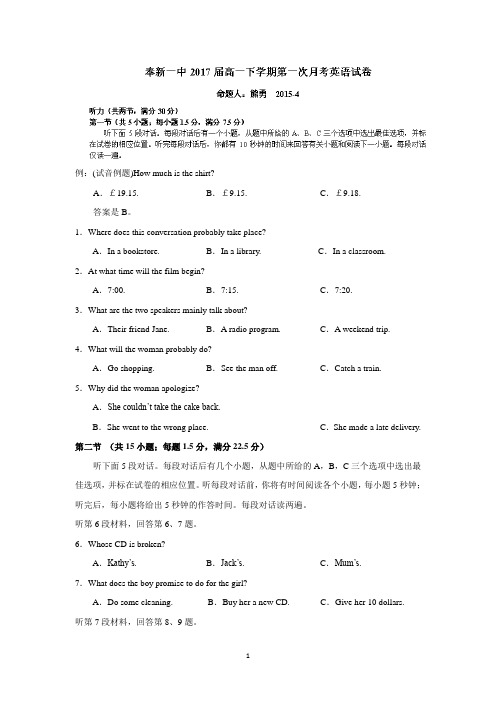
例:(试音例题)How much is the shirt?A.£19.15. B.£9.15. C.£9.18.答案是B。
1.Where does this conversation probably take place?A.In a bookstore. B.In a library. C.In a classroom.2.At what time will the film begin?A.7:00. B.7:15. C.7:20.3.What are the two speakers mainly talk about?A.Their friend Jane. B.A radio program. C.A weekend trip. 4.What will the woman probably do?A.Go shopping. B.See the man off. C.Catch a train.5.Why did the woman apologize?A.She couldn’t take the cake back.B.She went to the wrong place. C.She made a late delivery. 第二节(共15小题;每题1.5分,满分22.5分)听下面5段对话。
每段对话后有几个小题,从题中所给的A,B,C三个选项中选出最佳选项,并标在试卷的相应位置。
听每段对话前,你将有时间阅读各个小题,每小题5秒钟;听完后,每小题将给出5秒钟的作答时间。
每段对话读两遍。
听第6段材料,回答第6、7题。
6.Whose CD is broken?A.Kathy’s.B.Jack’s.C.Mum’s.7.What does the boy promise to do for the girl?A.Do some cleaning. B.Buy her a new CD. C.Give her 10 dollars.听第7段材料,回答第8、9题。
2015-2016学年江西省宜春市奉新县第一中学高一上学期第三次月考英语试题 word版
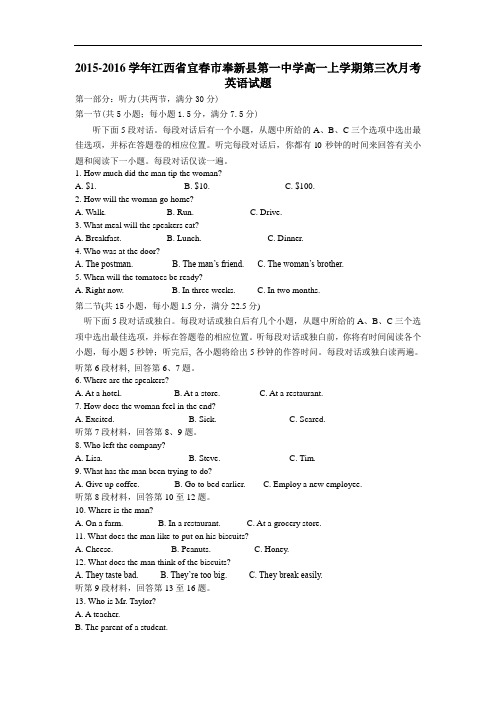
2015-2016学年江西省宜春市奉新县第一中学高一上学期第三次月考英语试题第一部分:听力(共两节,满分30分)第一节(共5小题;每小题1.5分,满分7.5分)听下面5段对话。
每段对话后有一个小题,从题中所给的A、B、C三个选项中选出最佳选项,并标在答题卷的相应位置。
听完每段对话后,你都有l0秒钟的时间来回答有关小题和阅读下一小题。
每段对话仅读一遍。
1. How much did the man tip the woman?A. $1.B. $10.C. $100.2. How will the woman go home?A. Walk.B. Run.C. Drive.3. What meal will the speakers eat?A. Breakfast.B. Lunch.C. Dinner.4. Who was at the door?A. The postman.B. The man’s friend.C. The woman’s brother.5. When will the tomatoes be ready?A. Right now.B. In three weeks.C. In two months.第二节(共15小题,每小题1.5分,满分22.5分)听下面5段对话或独白。
每段对话或独白后有几个小题,从题中所给的A、B、C三个选项中选出最佳选项,并标在答题卷的相应位置。
听每段对话或独白前,你将有时间阅读各个小题,每小题5秒钟;听完后, 各小题将给出5秒钟的作答时问。
每段对话或独白读两遍。
听第6段材料, 回答第6、7题。
6. Where are the speakers?A. At a hotel.B. At a store.C. At a restaurant.7. How does the woman feel in the end?A. Excited.B. Sick.C. Scared.听第7段材料,回答第8、9题。
奉新县第一中学高一上学期第一次月考英语试题-含答案

奉新县第一高级中学2021-2022学年高一上学期第一次月考英语试卷第一部分:听力(共两节,满分30分)第一节(共5小题;每小题1.5分,满分7.5分)听下面5段对话。
每段对话后有一个小题,从题中所给的A、B、C三个选项中选出最佳选项,并标在试卷的相应位置。
听完每段对话后,你都有10秒钟的时间来回答有关小题和阅读下一小题。
每段对话仅读一遍。
1. What is the man doing?A. Asking the way.B. Giving directions.C. Correcting a mistake.2. What dress size does the woman want?A. 8.B. 10.C. 12.3. What is the woman likely to do?A. Make a phone call.B. Handle the problem.C. Have a rest.4. Which tour does the man seem to be interested in?A. The evening tour.B. The half-day tour.C. The full-day tour.5. Where are the speakers?A. At a canteen.B. At a clinic.C. At a bank.第二节(共15小题;每小题1.5分,满分22.5分)听下面5段对话或独白。
每段对话或独白后有几个小题,从题中所给的A、B、C三个选项中选出最佳选项。
听第6段材料,回答第6、7题。
6. What does the woman think of the match?A. Entertaining.B. Discouraging.C. Boring.7. What do the speakers plan to do on Tuesday afternoon?A. Watch a game.B. Play tennis.C. Go to the cinema.听第7段材料,回答第8至10题。
江西省奉新一中高一英语上学期第一次月考试题(含解析)
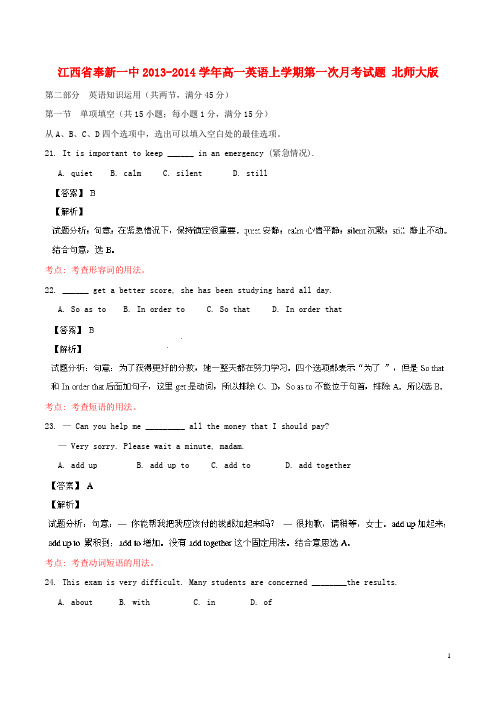
江西省奉新一中2013-2014学年高一英语上学期第一次月考试题北师大版第二部分英语知识运用(共两节,满分45分)第一节单项填空(共15小题;每小题1分,满分15分)从A、B、C、D四个选项中,选出可以填入空白处的最佳选项。
21. It is important to keep ______ in an emergency (紧急情况).A. quietB. calmC. silentD. still考点: 考查形容词的用法。
22. ______ get a better score, she has been studying hard all day.A. So as toB. In order toC. So thatD. In order that考点: 考查短语的用法。
23. — Can you help me _________ all the money that I should pay?— Very sorry. Please wait a minute, madam.A. add upB. add up toC. add toD. add together考点: 考查动词短语的用法。
24. This exam is very difficult. Many students are concerned ________the results.A. aboutB. withC. inD. of考点: 考查介词的固定搭配的用法。
选A。
25. It is said that more than ten thousand workers have ______ the strike(罢工).A. joinedB. joined inC. attendedD. take part考点: 考查动词的用法。
26. He looked at the envelope and __________ Jenny’s handwriting immediately.A. understoodB. knewC. recognizedD. recovered考点: 考查动词的用法。
江西省奉新县第一中学2015届高三上学期第一次月考英语试题
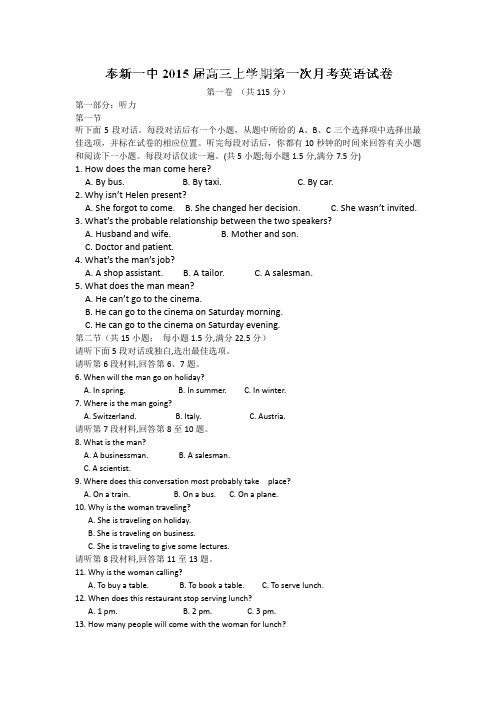
第一卷(共115分)第一部分:听力第一节听下面5段对话。
每段对话后有一个小题,从题中所给的A、B、C三个选择项中选择出最佳选项,并标在试卷的相应位置。
听完每段对话后,你都有10秒钟的时间来回答有关小题和阅读下一小题。
每段对话仅读一遍。
(共5小题;每小题1.5分,满分7.5分)1. How does the man come here?A. By bus.B. By taxi.C. By car.2. Why isn’t Helen present?A. She forgot to come.B. She changed her decision.C. She wasn’t invited.3. What’s the probable relationship between the two speakers?A. Husband and wife.B. Mother and son.C. Doctor and patient.4. What’s the man’s job?A. A shop assistant.B. A tailor.C. A salesman.5. What does the man mean?A. He can’t go to the cinema.B. He can go to the cinema on Saturday morning.C. He can go to the cinema on Saturday evening.第二节(共15小题;每小题1.5分,满分22.5分)请听下面5段对话或独白,选出最佳选项。
请听第6段材料,回答第6、7题。
6. When will the man go on holiday?A. In spring.B. In summer.C. In winter.7. Where is the man going?A. Switzerland.B. Italy.C. Austria.请听第7段材料,回答第8至10题。
江西省奉新县第一中学高一英语上学期第一次月考试题(2021年整理)

江西省奉新县第一中学2018-2019学年高一英语上学期第一次月考试题编辑整理:尊敬的读者朋友们:这里是精品文档编辑中心,本文档内容是由我和我的同事精心编辑整理后发布的,发布之前我们对文中内容进行仔细校对,但是难免会有疏漏的地方,但是任然希望(江西省奉新县第一中学2018-2019学年高一英语上学期第一次月考试题)的内容能够给您的工作和学习带来便利。
同时也真诚的希望收到您的建议和反馈,这将是我们进步的源泉,前进的动力。
本文可编辑可修改,如果觉得对您有帮助请收藏以便随时查阅,最后祝您生活愉快业绩进步,以下为江西省奉新县第一中学2018-2019学年高一英语上学期第一次月考试题的全部内容。
2021届高一上学期第一次月考英语试卷第Ⅰ卷(共100分,答案用2B铅笔涂在答题卡上)第一部分听力部分(共两节,满分30分)第一节(共5小题;每小题1.5分,满分7。
5分)听下面5段对话.每段对话后有一个小题,从题中所给的A、B、C三个选项中选出最佳选项,并标在试卷的相应位置.听完每段对话后,你都有10称钟的时间来回答有关小题如阅读下一小题。
每段对话仅读一遍。
1. Why is the man making the call?A。
To cancel an appointment. B。
To book an airplane ticket to Shanghai.C. To make an appointment with the woman.2。
What is the man's favorite exercise?A. Taking a walk。
B. Jogging.C. Playing football.3。
What does the woman usually do on weekends?A Go to the countryside. B。
Go fishing with her friends。
高一英语上第一次月考试卷

高一英语上第一次月考试卷高一月考英语试题(满分_0,时间1_分钟)第一部分:听力理解(略)第二部分:阅读理解(共两节_小题,满分40分)第一节(共_小题,每小题2分,共30分)阅读下列短文,从每题所给的四个选项(A、B、C和D)中,选出选项,并在答题卡上将该项涂黑。
As the father of a student, I have e_perienced first hand what a great teacher is. My son was in the 4th grade last year, and he had a teacher called Miss Green. I believe that when he is an adult he will surely look back on her as the best teacher he has ever had.My son has attention deficit disorder(注意力缺损症) that makes it a little more difficult for him to learn. She was able to change her teaching methods for him so that he could keep up with the rest of the class. As a result, he got straight As on many subjects. She regarded her class as a family and they even had their own class song. She would often have them sing it to encourage them and develop a team spirit for them. When she saw that they were no longer listening carefully to what she was teaching, she would have them close their te_tbooks, stand up all around the room and throw around a small football. This helped them clear their minds and then focus on the lesson again. Besides, she was quick to reply to anyphone calls or emails from us and got rid of our worries about children quickly.When my son went to the 5th grade this year, we happened to pass her classroom. When she saw my son, she smiled, and she came out and hugged him. She generally loves all of the children in her classroom and that love really shows. I can only pray that my son will continue to get teachers just like her for the rest of his school years._. With the teacher’s help, the writer’s son ______.A. became the best student in his classB. was interested in singing songsC. quickly finished his 4th grade lessonsD. improved his grades greatly_. Which of the following is NOT true about Miss Green?A. She regarded the students as members of a family.B. She had special ways to help students study.C. She was good at teaching football and music.D. She usually made a quick reply to parents’ ema ils.23. We can learn from the passage that ______.A. Miss Green didn’t teach the writer’s son in the 5th gradeB. Miss Green was the best teacher at the schoolC. all the students in the school liked Miss GreenD. the writer’s son had many teachers like Miss Green24. In the passage, the writer mainly tells us ______.A. what his son studied at schoolB. his son once had a good teacherC. how to be a good and popular teacherD. a teacher who liked playing with studentsMy husband, my four-month-old daughter and I set out on a five-day driving journey from California to Washington. We had to stop frequently because our little child needed to stretch from the car seat.One of our stops, once we crossed the Oregon border, was at a Black Bear Diner. Walking towards the front door we noticed a gentleman standing at one side. He was clearly untidy, without shoes and wearing worn clothing. We passed right by him and opened the restaurant door. Then something told me to go back.Holding my daughter, I tur ned around and said to the gentleman, “Sir. Are you hungry?” He said, “Yes.” I then asked, “May we b uy you something t o eat?” He responded with, “Sure, I can order something myself.”My husband opened the door and the gentleman went straight to the counter.I told him to order whatever he wanted. The manager of the restaurant came over quite quickly and looked frightened. I s poke before he had an opportunity to. “This gentleman will have lunch with us today,” I said. “Please add his order to our bill.” T he manager said with a frown(皱眉), “Okay.” We turned to our table and the g entleman said, loudly and quic kly, “Thank You!” We were seated and upon completing our meal we were handed our bill. I asked my husband what the gentleman had ordered. One fresh orange juice, one coffee, one breakfast combination with a side of hash browns.When we left the restaurant I looked for the gentleman but didn’t see him, but that very small act just made my day. I hope in some small way we were able to add some joy to his life, even if only for a few minutes.25. From the appearance of the gentleman, we can guess he was probably a(n) _____.A. waiterB. actorC. beggarD. worker26. The manager of the restaurant looked frightened because _____.A. the man was not f riendlyB. the man had stolen something from the restaurantC. he had fired the man beforeD. he was afraid the man wouldn’t afford to pay the food27. From the passage, we can infer the man _____.A. was thankful for their kind actB. felt ashamed and slipped awayC. was hungry and ate a lot of foodD. was too proud to accept their offer28. The phrase “made my day” in the last paragraph probably means ______.A. wasted my moneyB. made me very happyC. made me feel sorryD. moved me deeplyIf you have a chance to go to Finland, you will probably be surprised to find how “foolish” the Finnish people are.Take the ta_i drivers for e_ample. Ta_is in Finland are mostly high-class Benz with a fare of two US dollars a kilometer. You can go anywhere in one, tell the driver to drop you at any place, say that you have some business to attend to, and then walk off without paying your fare. The driver would not show the least sign of an_iety.The dining rooms in all big hotels not only serve their guests, but also serve outside diners. Hotel guests have their meals free, so they naturally go to the free dining rooms to have their meals. The most they would do to show their good faith is to wave their registration card to the waiter. With such a loose check, you can easily use any old registration card to take a couple of friends to dine free of charge.The Finnish workers are paid by the hour. They are very much on their own as soon as they have agreed with the boss on the rate(价钱). From then on, they just say how many hours they have worked and they will be paidaccordingly(相应地).With so many loopholes(漏洞) in everyday life, surely Finland must be a heaven to those who love to take “petty advantages”. But the strange thing is, all the ta_i passengers would always come back to pay their fare after they have attended to their business; not a single outsider has ever been found in the free hotel dining rooms. And workers always give an honest account of the e_act hours they put in. As the Finns always act on good faith in everything they do, living in such a society has turned everyone into a real “gentleman”.In a society of such high moral practice, what need is there for people to be on guard against others?29. While taking a ta_i in Finland, _____.A. a passenger can go anywhere without having to pay the driverB. a passenger pays two US dollars for a ta_i rideC. a passenger can never be turned down by the ta_i driver wherever he wants to goD. a passenger needs to provide good faith demonstration (证明) before leaving without paying30. We know from the passage that big hotels in Finland ________.A. are mostly poorly managedB. provide meals for any dinersC. provide free wine and charge for foodD. provide meal for only those who live in the hotels31. Which of the following is NOT true according to the passage?A. The workers in Finland are paid by the hour.B. The workers are always honest with their working hours.C. The workers and their bosses will make an agreement in advance about the pay.D. The bosses in Finland are too busy to check the working hours of their employees.32. The word “those” in t he last but one paragraph probably refers to _____.A. people who are dishonestB. people who often have meals in big hotelsC. people who often take ta_isD. people who are worthy of trustWhen we talk about intelligence, we do not mean the abil ity to get good scores in certain kinds of tests or even the ability to do well in school. By intelligence we mean a way of living and behaving, especially in a new or an_ious situation. If we want to test intelligence, we need to find out how a person acts instead of how much he knows what to do.For e_ample, when in a new situation, an intelligent person thinks about the situation, not about himself or what might happen to him. He tries to find out all he can, and then he acts immediately and tries to do something about it. He probably isn’t sure how it will all work out, but at least he tries. And, if he can’t make things work out right, he doesn’t feel ashamed that he fails; he just tries to learn from his mistakes. An intelligent person, even if he is very young, has a special outlook(人生观) on life, special feeling about life, and knows how he fits into it.If you look at children, you’ll see great difference between what we call “bright” children and “not bright” children. They are actually two different kinds of people, not just the same kind with different amounts of intelligence. For e_ample, the bright child really wants to find out more about life --- he tries to get in touch with everything around him. But the unintelligent child keeps more to himself and h is own dream-world; he seems to have a wall between him and life in general.33. What’s the main idea of the passage?A. What’s real meaning of intelligenceB. What’s the “bright” children’s behaviorC. What’s a special outlook on lifeD. How to live and behave in a new situation349. In the author’s opinion the biggest difference between “bright” children and “not bright” children lies in ____________.A. the amount of intelligenceB. the different situations they faceC. the different attitudes to lifeD. the background of life35. What might the author continue to talk about in the passage that follows?A. how to determine what intelligence isB. how an unintelligent person should be taughtC. how to judge whether a person is intelligentD. how education should be changed第二节(共5小题;每小题2分,共_分)根据短文内容,从短文后的七个选项中选出能填入空白处的选项,并在答题卡上将该项涂黑,选项中有两项为多余选项。
江西省宜春市上高二中2015-2016学年高一上学期第一次月考试题 英语 Word版含答案
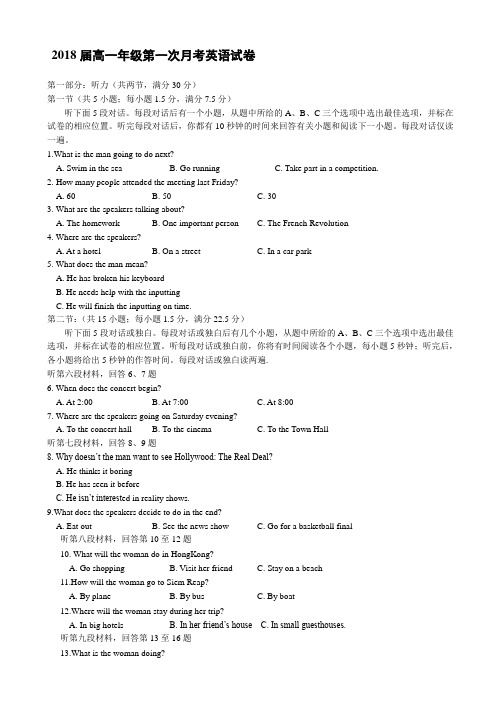
2018届高一年级第一次月考英语试卷第一部分:听力(共两节,满分30分)第一节(共5小题;每小题1.5分,满分7.5分)听下面5段对话。
每段对话后有一个小题,从题中所给的A、B、C三个选项中选出最佳选项,并标在试卷的相应位置。
听完每段对话后,你都有10秒钟的时间来回答有关小题和阅读下一小题。
每段对话仅读一遍。
1.What is the man going to do next?A. Swim in the seaB. Go runningC. Take part in a competition.2. How many people attended the meeting last Friday?A. 60B. 50C. 303. What are the speakers talking about?A. The homeworkB. One important personC. The French Revolution4. Where are the speakers?A. At a hotelB. On a streetC. In a car park5. What does the man mean?A. He has broken his keyboardB. He needs help with the inputtingC. He will finish the inputting on time.第二节:(共15小题;每小题1.5分,满分22.5分)听下面5段对话或独白。
每段对话或独白后有几个小题,从题中所给的A、B、C三个选项中选出最佳选项,并标在试卷的相应位置。
听每段对话或独白前,你将有时间阅读各个小题,每小题5秒钟;听完后,各小题将给出5秒钟的作答时间。
每段对话或独白读两遍.听第六段材料,回答6、7题6. When does the concert begin?A. At 2:00B. At 7:00C. At 8:007. Where are the speakers going on Saturday evening?A. To the concert hallB. To the cinemaC. To the Town Hall听第七段材料,回答8、9题8. Why doesn’t the man want to see Hollywood: The Real Deal?A. He thinks it boringB. He has seen it beforeC. He isn’t interest ed in reality shows.9.What does the speakers decide to do in the end?A. Eat outB. See the news showC. Go for a basketball final听第八段材料,回答第10至12题10. What will the woman do in HongKong?A. Go shoppingB. Visit her friendC. Stay on a beach11.How will the woman go to Siem Reap?A. By planeB. By busC. By boat12.Where will the woman stay during her trip?A. In big hotelsB. In her friend’s houseC. In small guesthouses.听第九段材料,回答第13至16题13.What is the woman doing?A. Suggesting a jobB. Doing an interviewC. Advertising a job.14.What kind of people does the job want?A. Someone who has an MBA .B.Someone who can speak foreign languages.C.Someone who has the experience of living abroad.15.What is the date today?A.The 3rd of JuneB. The 3rd of JulyC. The 3rd of August16.What will the woman do next?plete the applicationsB. Have a meeting with the manC.E-mail the man the adverts听第十段材料,回答第17至20题17. What was the purpose of Columbus’ first trip?A. To collect plantsB.To look for goldC. To learn about American cultures18. Why does the corn feed millions of people today?A.It is delicious and cheapB. It can be cooked in many waysC.It grows easily in various conditions19. What did Columbus bring back on his second trip?A. Chocolate beansB. Fried potatoesC. Sweet corn20. What was the result of Columbus’ two trips to America?A. They made native Americans enjoy European foods.B. They made native American foods popular.C. They made native American lifestyle well-known.第二部分:阅读理解(共两节,满分40分)第一节:阅读下列材料,从每题所给的四个选项(A、B、C和D)中,选出最佳选项。
- 1、下载文档前请自行甄别文档内容的完整性,平台不提供额外的编辑、内容补充、找答案等附加服务。
- 2、"仅部分预览"的文档,不可在线预览部分如存在完整性等问题,可反馈申请退款(可完整预览的文档不适用该条件!)。
- 3、如文档侵犯您的权益,请联系客服反馈,我们会尽快为您处理(人工客服工作时间:9:00-18:30)。
奉新一中2018届高一上学期月考一英语试卷命题人:余娜2015.9.30第Ⅰ卷(共100分,答案用2B铅笔涂在答题卡上)第一部分。
听力(共两节,满分30分)第一节(共5小题;每小题1.5分,满分7.5分)听下面5段对话。
每段对话后有一个小题,从题中所给的A、B、C三个选择项中选择出最佳选项,并标在试卷的相应位置。
听完每段对话后,你都有10秒钟的时间来回答有关小题和阅读下一小题。
每段对话仅读一遍。
1. When will the speakers get to the theater?A. At 7:10.B. At 7:25.C. At 7:30.2. What did the man do yesterday afternoon?A. He went out with Ken.B. He played basketball.C. He watched TV.3. Where are the two speakers?A. In a hotel.B. At a dinner table.C. At the man’s house.4. What does the man like doing best on Sundays?A. Staying at home.B. Visiting his friends.C .Walking in the forest.5. What are the speakers talking about?A. What they should read.B. Business newspaper.C. A story about an elephant and a mouse.第二节(共15小题;每小题1.5分,满分22.5分)听下面5段对话或独白。
每段对话或独白后有几个小题,从题中所给的A、B、C三个选项中选出最佳选项,并标在试卷的相应位置。
听每段对话或独白前,你将有时间阅读各个小题,每小题5秒钟,听完后,各小题将给出5秒钟的作答时间。
每段对话或独白读两遍。
听第6段材料,回答第6、7题。
6. What day is it today?A. FridayB. SaturdayC. Sunday7. What will the woman do first after class?A. Go to the zoo.B. Go home.C. Go to the cinema. 听第7段材料,回答每8至9题。
?8. What is the woman doing now?A. Apologizing to the manB. Inviting the manC. Thanking the man.9. What did the woman do last night?A. She held a great party.B. She talked loudly with someone.C. She watched a football match on TV听第8段材料,回答第10至12题。
10. What are the speakers talking about?A. The m an’s trip to New York.B. The woman’s trip to New York.C. The woman’s physics class11. What did the woman see in New York?A. The New York libraryB. The New York City ParkC. The Statue of Liberty12. What advice does the woman give to the man?A. Visiting the Statue of LibertyB. Visiting New York in spring or autumnC. Visiting the New York City Park听第9段材料,回答第13至16题。
13. What happened to the man?A. He had an accident in the bus.B. His car drove into a bus.C. He drank too much wine.14. What do we know about the car driver?A. He was drunk.B. He was a new driver.C. He was good at driving.15. Where did the car driver go after the accident?A. The test center.B. The hospital.C. The police office.16. Who was hurt in this accident?A. Nobody.B. A little girl.C. The man.听第10段材料,回答第17至20题。
17. Why did the speaker stay up to read books?A. She loved reading.B. She wanted to know The Three Kingdoms.C. She had an exam the next day.18. What do today’s adults think of pupils in the speaker’s opinion?A. Pupils don’t need to do any homework.B. Pupils are always happy.C. Pupils need to do lots of sports.19. How was the speaker feeling when the clock struck 2?A. Very tired and sleepyB. Very happyC. Excited and interested20. Where did the speaker sleep that night?A. In the bed.B. On the desk.C. On the floor.第二部分。
阅读理解(共两节,满分40分)第一节(共15小题;每小题2分,满分30分)阅读下列短文,从每题所给的四个选项(A 、B 、C 和D )中,选出最佳选项,并在答题卡上将该项涂黑。
AMr. Lang worked in a factory. As a driver, he was busy but he was paid much. His wife was an able woman and did all the housework. When he came back, she took good care of him and he never did anything at home. So he had enough time when he had a holiday. A few friends of his liked gambling(赌博) and he learned it soon. So he was interested in it and hardly forgot anything except gambling. He lost all his money and later he began to sell the television, watches and so on. His wife told him not to do it but he didn’t listen to her. She had to tell the police. He and his friends were punished for it. And he was hardly sent away. After he came out of lockup(拘留所), he hated her very much and the woman had to leave him.It was New Year’s Day. Mr. Lang didn’t go to work. He felt lonely and wanted to gamble again. He called his friends and they came soon. But they were afraid the police would come. He told his five-year-old son to go to find out if there were the policemen outside. They waited for a long time and didn’t think the police would come and began to gamble. Suddenly opened the door and in came a few policemen.“I saw there weren’t any policemen outside, daddy,”said the boy, “so I went to the crossing and asked some to come.”21. Mrs. Lang did all housework because _______.A. she couldn’t find any workB. she thought her husband was tiredC. her husband spent all time in gamblingD. she wouldn’t stop her husband gambling22. The woman had to leave Mr. Lang because _______.A. he didn’t love her any longerB. he wouldn’t stop gamblingC. he had been put into lockupD. he was hardly sent away by the factory23. Which of the following is right?A. The boy hoped his father to be put into lockup again.B. The boy thought his father needed some policemen.C. The boy hoped his father to stop gambling soon.D. The boy hoped his mother to come back.BMaking friends is a skill like many other skills. It improves with practice. If you want to meet people and make friends, you must be willing to take some actions. You must first go where there are people. You won't make friends staying home alone. Join a club or a group. Talking with those who like the same things as you do is much easier. Or join someone in some activities. Many people are nervous when talking to new people. After all meeting strangers means facing the unknown. And it's human nature to feel a bit uncomfortable about the unknown. Most of our fears about dealing with new people come from doubts about ourselves. We imagine other people are judging us or finding us too tall or too short, too this or too that. But don't forget that they must be feeling the same way. Try to accept yourself as you are and try to put the other person at ease. You'll both feel more comfortable.Try to act self-confidently even if you don't feel that way. When you enter a room full of strangers, such as a new classroom, walk tall and straight, look directly at other people and smile.If you see someone you'd like to speak to, say something. Don't wait for the other person to start a conversation.Just meeting someone new does not mean that you will make friends with that person—friendship is based on mutual liking and“give and take”. It takes time and effort to develop.24. The best title of the text may be________.A. FriendshipB. How to Make FriendsC. Meeting New PeopleD. Facing the Unknown25. You can't make friends if you________.A. take some actionsB. go to where there are peopleC. avoid meeting peopleD. won't start a conversation26. Friendship is based on________.A. self-confidenceB. meeting more unknown peopleC. more talking and smiling to peopleD. taking from and giving to people27. Which of the following statements is NOT true?A. Making friends needs practising.B. Making friends needs to be more active in starting a conversation.C. When meeting someone, make him feel nice and starting a conversation.D. Before making friends with someone, judge if he's too this or too that.CEveryday, 340 million people speak it. One billion people are learning it and it is said that by 2050, half of the world's population will be using it. What are we talking about? That globallanguage—English.The English language started in Britain in the 5th century. It is a mixed language. It was built up when German,Scandinavian and French invaders settled in England and created a common language for communication.Today it is the official language of the UK, the USA, Australia, New Zealand, Canada, South Africa and Ireland as well as many islands in the Caribbean . Many other countries and regions use it for politics and business, for example, India. Pakistan, Nigeria and the Philippines. English is also one of the official languages of Hong Kong.But global advertising and pop music mean that in most countries, you will see or hear some English. Thanks to McDonalds, we all know about "burgers", "fries" and "milkshakes". Songs by Madonna, Britney Spears and Celine Dion are in English. We can sing along, even if we do not understand what we are singing!English is a messy (杂乱的) language. Every year, dictionaries include new words that talk about popular culture, for example, computer-related words such as "blogging", "download" and "chatroom". Also included are words that teenagers use. Who does not know "cool", "OK" and “hello” ?Other languages also influence English. Many English words come from French. Words like "cafe" and expressions like "c'est la vie" (that is life) are all part of the English language. On the other hand, the French language includes English words like "le weekend" and "le camping". German words are also part of English. Words like "kindergarten" come from the German language.Recently, British people have become interested in "yoga". But the word comes from an ancient Hindu language in India.28. The English language has a history of ______.A. over 2000 yearsB. over 500 yearsC. over 1500 yearsD. over 1000 years29. Which of the following statements is true about the language of English ?A. It has been changing all the time.B. It has borrowed words from all the other languages.C. French words are used by the English because dictionaries have French words.D. Singers and film stars have the greatest influence on language.30. How many people in the world are using English now?A. One billion peopleB. 340 millionC. almost all the people in the world.D. not mentioned above, but the number is growing rapidly.31. Many countries and regions use it for politics and business except______.A. the USAB. NigeriaC. the PhilippinesD. NorwayDRoger was a thief,but he wasn't very clever. When he was in school, he stole apples or oranges from other children. Sometimes he stole pencils or books from other children. But he always got caught.The teacher spoke to Roger's parents and they tried to stop him from stealing things, but Roger wouldn't stop. He kept stealing.When he was older, he began to steal from stores, but he was still stupid. Once, he went into a store wearing the clothes he had stolen the day before. The clothes still had the price tags(标签)on them, and the store manager called the police. They warned him that he would go to jail if he didn't stop stealing.Then Roger decided to rob a bank. He planned everything. He got some gloves so that he would not leave fingerprints, and a mask so that no one would recognize him." But what if they recognize my voice?" he thought.He decided to write his message on a piece of paper so that he wouldn't need to speak. He found an old envelope and wrote "give me all the money" on the back of it. He got a toy gun and went to the bank. He put on his mask and his gloves and showed the note to the bank clerk. The clerk gave him all the money, and Roger ran out of the bank and went home.Ten minutes later he heard a knock on the door. It was the police. They had come to arrest him for robbing the bank." How did you find me so quickly?" asked Roger" It was easy," said the police." Your address was on the envelope!"32. How old was Roger when he started stealing things?A. 10B. 40C. 70D. 2233. What is something Roger did not steal?A. moneyB. foodC. a shirtD. a bicycle34. In this story, the underlined word "recognize" means __________.A. knowB. makeC. watchD. understand35. How did the police catch Roger?A. His friend worked in the bank.B. The clerk knew his voice.C. They found his picture.D. They knew his address.第二节(共5小题;每小题2分,共10分)根据短文内容,从短文后的七个选项中选出能填入空白处的最佳选项。
